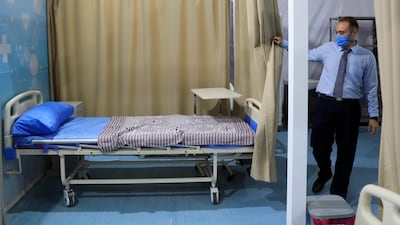Hailed as the "biggest breakthrough yet" in the fight against Covid-19, British researchers say a cheap, widely-available drug substantially cuts the risk of death of seriously ill patients.
The results are said to be so impressive they have been announced before being subjected to scientific scrutiny.
But after so many spurious claims about coronavirus treatments, can the results be trusted?
What’s sparked the excitement?
According to a study involving thousands of patients in the UK, a drug called dexamethasone cut the death rate among the most seriously ill Covid-19 patients by 35 per cent.
Such patients are so ill that they have to be artificially ventilated, and often have less than a 50:50 chance of surviving.
The study also found that less sick patients needing only oxygen support also benefited from the drug, with a 20 per cent cut in the death rate.
Professor Peter Horby of the University of Oxford, one of the chief investigators on the research, estimates that had the effectiveness of the drug been recognised at the start of the pandemic, it would have saved “thousands of lives” in the UK alone.
Why does the drug work?
First manufactured in 1957, dexamethasone is a steroid widely used to treat inflammatory conditions like rheumatoid arthritis, asthma and skin diseases.
Its relevance to Covid-19 lies in its ability to dampen down the reaction of the body's immune system. Once the coronavirus enters the body, it is attacked by the immune system and usually eliminated. But in some patients, the attack runs out of control, triggering a "cytokine storm" which can lead to organ failure and death.
Until the 1980s, large doses of dexamethasone were often used to fight this effect of infection - known as sepsis - but fell out of favour when studies suggested they did more harm than good. Despite also failing to show much benefit against the related diseases Sars and Mers, the UK researchers decided the drug was still worth trying at much lower doses with Covid-19 patients.
Can the new results be trusted?
The results come from the Recovery study, funded by the UK government to find effective treatments against Covid-19 as rapidly as possible.
Involving more than 11,000 patients, the research uses randomised controlled trials to assess candidate treatments.
This is widely regarded as much more reliable method than simply sifting through medical reports of how patients fared – the method now at the centre of a scandal concerning another potential coronavirus treatment, hydroxychloroquine.
To investigate dexamethasone, the Recovery team compared the outcomes of more than 2,100 patients chosen at random to receive the drug with those of around 4,300 patients who received standard care.
The random selection cuts the risk of any observed benefit being due to something other than the drug. The sheer number of patients also boosts the precision of the final result. Taken together, these measures build confidence in the overall finding.
Why did the researchers stop the study and announce the results?
Trials of a new drug are often stopped early if the results point to a dramatic effect – good or bad. In the case of dexamethasone, the cut in fatality rate was so impressive that independent experts decided it would be unethical not to alert doctors around the world immediately. Even so, the researchers said the results would still be submitted to a leading medical journal for scrutiny.
Can we be confident the drug will work for everyone?
It is already clear that it doesn’t: the drug results only showed benefit with seriously ill patients, either on a ventilator or being given oxygen externally.
Among Covid-19 patients who do not need help with breathing, the results suggest the drug may increase the risk of death. The reasons are as yet unclear.
Questions also surround the impact of the drug on the long-term survival of patients. The trial only recorded the fate of patients up to 28 days from starting treatment. It is possible that the drug reduces longer-term complications among survivors.
There is also no reason to believe the drug might protect healthy people against infection by Covid-19.
What happens next?
The drug is globally available at low cost. According to the researchers, the 10-day course of treatment - either taken intravenously or by tablet - works out at around £35 per life saved.
However, some researchers in the US have said they want to see the full results in a medical journal before using the drug.
Robert Matthews is Visiting Professor of Science at Aston University, Birmingham, UK










